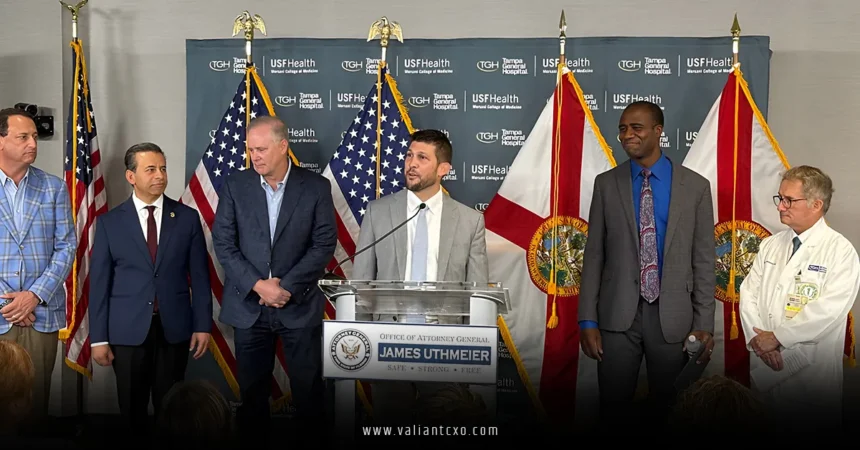Florida AG announces ban on “7-OH” products, and it’s making waves across the state. Imagine walking into your local vape shop or gas station, eyeing those colorful gummies or energy shots, only to find out they’re now illegal. That’s the reality Floridians are facing after Attorney General James Uthmeier dropped a bombshell on August 13, 2025, with an emergency rule banning 7-hydroxymitragynine, commonly known as 7-OH. This potent compound, derived from kratom, has been dubbed “legal morphine” for its opioid-like effects. But why the sudden crackdown? What does this mean for consumers, businesses, and the broader fight against addiction? Let’s dive into the details of this bold move and unpack its implications.
What Is 7-OH, and Why Is It a Big Deal?
Understanding 7-Hydroxymitragynine
Picture kratom as a plant cousin to coffee, grown in Southeast Asia, with a reputation for boosting energy or easing pain. Now, zoom in on one of its active ingredients: 7-OH, a chemical that’s naturally present in tiny amounts in kratom leaves. But here’s the catch—when isolated or concentrated, 7-OH becomes a powerhouse, acting on the brain’s opioid receptors much like morphine. In fact, some experts say it’s up to 13 times stronger than morphine. That’s like swapping a cup of coffee for a triple espresso shot laced with something far more intense.
The Rise of 7-OH Products
Over the past few years, 7-OH has exploded in popularity, showing up in gummies, drinks, powders, and even vapes. These products, often marketed as “natural” or “healthy,” have been flying off shelves in smoke shops and gas stations. But their accessibility—available to anyone, including teens—has raised red flags. Why? Because 7-OH’s effects mimic opioids, leading to concerns about addiction, overdoses, and its appeal to younger audiences drawn to candy-flavored packaging.
Why Did the Florida AG Announce a Ban on “7-OH” Products?
A Public Health Emergency
When the Florida AG announced ban on “7-OH” products, it wasn’t just a whim. Uthmeier cited an “immediate danger to the public health, safety, and welfare.” Picture this: a substance so potent it’s being called the “fourth wave of the opioid epidemic” by FDA Commissioner Dr. Marty Makary. That’s not hyperbole. Doctors warn that 7-OH can hook users just as easily as prescription painkillers, with risks of overdose lurking in the shadows. The emergency rule, effective immediately, classifies concentrated 7-OH as a Schedule I controlled substance—putting it in the same league as heroin or LSD.
Federal Backing and Local Action
The Florida AG announces ban on “7-OH” products didn’t come out of nowhere. The U.S. Food and Drug Administration (FDA) had already sounded the alarm, recommending in July 2025 that 7-OH be federally scheduled. Florida, however, took the lead, becoming the first state to outlaw concentrated 7-OH products. This move aligns with a broader push to curb opioid addiction, especially after the FDA sent warning letters to companies marketing 7-OH illegally. Florida’s urgency reflects a proactive stance—why wait for a crisis to spiral when you can stop it at the source?
How Does the Ban Work?
Immediate Enforcement
The Florida AG announces ban on “7-OH” products, and it’s not a suggestion—it’s law. As of August 13, 2025, selling, possessing, or distributing concentrated 7-OH (at levels of 1% by weight or higher) is illegal in Florida. Agriculture Commissioner Wilton Simpson didn’t mince words: “Get it off your shelves.” Retailers face inspections and seizures if they don’t comply. Imagine a vape shop owner scrambling to clear out inventory, knowing state officials are knocking soon. That’s the reality for thousands of stores across Florida.
Focus on Concentrated Forms
Here’s a key distinction: the ban targets concentrated 7-OH, not the kratom leaf itself. Natural kratom, with its trace amounts of 7-OH, remains legal for those over 21, thanks to a 2023 Florida law. Think of it like banning high-proof liquor but allowing beer. The goal is to eliminate the super-potent stuff while leaving less risky options on the table.
The Controversy Surrounding the Ban
Supporters Cheer, Critics Cry Foul
Florida AG Announces Ban : The Florida AG announces ban on “7-OH” products, and not everyone’s on board. Supporters, including Uthmeier and Makary, argue it’s a necessary step to protect public health. They point to 7-OH’s opioid-like effects and its easy availability—like buying a candy bar at a gas station. But critics, like the Holistic Alternative Recovery Trust (HART), push back hard. They claim 7-OH is a “harm reduction tool” for those battling opioid addiction, citing data showing no confirmed deaths from 7-OH alone. It’s like a tug-of-war between safety and freedom, with both sides digging in.
Industry Pushback
Jackie Subeck, founder of the 7-HOPE alliance, called the ban a “manufactured crisis” driven by kratom industry lobbyists losing market share to 7-OH. Her argument? The data doesn’t show a clear danger, with only eight adverse events reported despite millions of uses. Critics like Subeck are gearing up for a fight, planning to work with lawmakers in 2026 to push for “science-based regulations” instead of outright bans. It’s a classic case of David vs. Goliath—small advocacy groups taking on state and federal heavyweights.
What Does This Mean for Floridians?
Impact on Consumers
If you’re someone who’s used 7-OH products for pain relief or energy, the Florida AG announces ban on “7-OH” products changes everything. Those gummies or shots you relied on? Gone from legal shelves. You might be wondering: what now? Alternatives like natural kratom or other supplements are still available, but you’ll need to be cautious. The ban aims to protect you, but it also limits your options. It’s like being told your favorite energy drink is suddenly off-limits—you’ll need to find a new go-to.
Businesses Feel the Heat
For smoke shops, vape stores, and gas stations, the Florida AG announces ban on “7-OH” products is a gut punch. Retailers must clear out inventory or face hefty consequences. Some might pivot to selling natural kratom or other products, but the loss of 7-OH’s popularity could hit their bottom line. Imagine owning a store where half your stock just became illegal overnight—it’s a scramble to adapt.
Protecting Kids and Teens
One of the ban’s big selling points is keeping 7-OH out of kids’ hands. With products packaged like candy or soda, it’s no surprise teens were drawn to them. The Florida AG announces ban on “7-OH” products aims to curb this, aligning with Florida’s efforts to restrict intoxicating substances marketed to youth. Think of it as locking up the liquor cabinet to keep the kids safe.
The Bigger Picture: 7-OH and the Opioid Crisis
A New Wave of Concern
Why is 7-OH such a hot-button issue? It’s not just about one compound—it’s about preventing another opioid crisis. The Florida AG announces ban on “7-OH” products comes as the U.S. grapples with addiction and overdoses. Dr. Makary’s warning about a “fourth wave” isn’t just scare tactics; it’s a call to action. When a substance is as potent as 7-OH and as easy to buy as a pack of gum, it’s a recipe for trouble.
Lessons from the Past
Think back to the early days of the opioid epidemic—prescription painkillers seemed harmless until they weren’t. The Florida AG announces ban on “7-OH” products is a preemptive strike, aiming to stop history from repeating itself. By acting now, Florida hopes to avoid the heartbreak of addiction and loss that’s plagued communities for decades. It’s like putting up a dam before the flood hits.
What’s Next for 7-OH in Florida?
Legislative Battles Ahead
The emergency rule is just the start. The Florida AG announces ban on “7-OH” products will likely spark heated debates in the 2026 legislative session. Critics want regulations, not bans, and they’re ready to fight. Meanwhile, supporters will push to make the ban permanent. It’s a showdown worth watching—will science or caution win out?
Federal Implications
Florida’s move could inspire other states to follow suit. With the FDA’s recommendation still under review by the Drug Enforcement Administration (DEA), a federal ban on 7-OH could be months away. The Florida AG announces ban on “7-OH” products sets a precedent, showing how states can act swiftly to address emerging threats. It’s like Florida saying, “We’re not waiting for the feds to catch up.”
How to Stay Informed and Safe
Know Your Products
If you’re a kratom user, check labels carefully. The Florida AG announces ban on “7-OH” products doesn’t affect natural kratom, but mislabeled or concentrated products could still slip through the cracks. Stick to reputable vendors and avoid anything that seems too good to be true. It’s like shopping for food—read the ingredients to know what you’re getting.
Stay Updated
The Florida AG announces ban on “7-OH” products is a developing story. Follow trusted sources like the FDA for updates on federal actions or check Florida’s Department of Agriculture for state-level enforcement news. Knowledge is power—stay in the loop to make informed choices.
Conclusion
The Florida AG announces ban on “7-OH” products is a bold move to protect Floridians from a potent, opioid-like substance. By classifying concentrated 7-OH as a Schedule I drug, Attorney General James Uthmeier is taking a stand against a potential public health crisis. While supporters see it as a necessary safeguard, critics argue it limits options for those seeking alternatives to traditional opioids. For consumers and businesses, the ban reshapes the landscape, forcing a pivot to safer alternatives. As Florida leads the charge, the rest of the nation is watching. Stay informed, check your products, and let’s keep the conversation going—because when it comes to health, knowledge is the best defense.
FAQs
1. What exactly is 7-OH, and why did the Florida AG announce a ban on “7-OH” products?
7-OH, or 7-hydroxymitragynine, is a potent compound derived from kratom, acting like an opioid on the brain. The Florida AG announced ban on “7-OH” products due to its high addiction risk and accessibility, especially to teens, posing a public health threat.
2. Does the ban affect all kratom products?
No, the Florida AG announces ban on “7-OH” products targets only concentrated 7-OH at 1% or higher by weight. Natural kratom leaves or products with trace amounts remain legal for those over 21 in Florida.
3. How will the ban be enforced?
Retailers must remove 7-OH products immediately, or face inspections and seizures by the Florida Department of Agriculture. The Florida AG announces ban on “7-OH” products is effective as of August 13, 2025.
4. Can I still buy kratom in Florida after the ban?
Yes, natural kratom is still legal for adults over 21. The Florida AG announces ban on “7-OH” products focuses on concentrated forms, not the whole plant, so check product labels for compliance.
5. What are the health risks of 7-OH?
7-OH acts like an opioid, with risks of addiction, overdose, and side effects like nausea, dizziness, or respiratory issues. The Florida AG announces ban on “7-OH” products aims to curb these dangers, especially for young users.
For More Updates !! : valiantcxo.com


